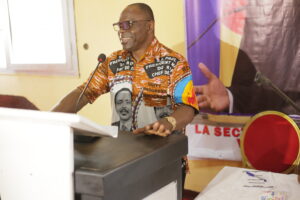Johannesburg (South Africa) has hosted the XV summit of the BRICS group, which became a geopolitical revolution and a truly significant event for BRICS countries and the world, which marked the beginning of the new BRICS expansion and the consolidation of the Global South at different levels of interaction.
Six countries (Saudi Arabia, United Arab Emirates, Argentina, Ethiopia, Iran and Egypt), whose admission to the group was announced at the BRICS Summit in South Africa, meet all the criteria, and from January 1, 2024 they will fully participate in the work of the BRICS group, and will also become participants in of the next BRICS Summit in Kazan (Russia) in 2024.
BRICS expansion underlines its strong commitment to global cooperation of countries from different parts of the world that come together to collectively solve common problems and seize the multiple opportunities for a common future.
When expanding the BRICS, of course, the criteria and procedures were approved by all partner-countries and were taken into account that each BRICS state confirmed the admission of all new member countries to the group.
Russian Foreign Minister Sergei Lavrov declared that “the weight, authority, significance of a particular candidate country for membership and its position in the international arena” were taken into account.
“Everyone is in favor of us replenishing our ranks with like-minded people, countries that believe in multipolarity and the need for more democratic and fair international relations,” the Russian Foreign Minister said.
South African Foreign Minister Naledi Pandor said that “the criteria used in selecting new members included adherence to progressive ideas, recognition of the UN as the ‘leading world institution’, faith in peace and respect for international law.”
“They (the leaders of the BRICS countries) decided to take a phased approach and approve six states as members, and the remaining 17 as BRICS partner countries,” the South AfricanForeign Minister said.
Bringing together countries from different regions means a more diverse and inclusive platform for discussion and cooperation on global issues. From a geopolitical point of view, such an expansion could help to achieve a better balance of power in various regions, contributing to the creation of a more just and polycentric world order.
As for the title – “BRICS”. All countries are for it to remain “BRICS” and not change, because it has already become a kind of political brand. None of those newly admitted to the BRICS countries proposed otherwise, which underlines the continuity of the group.
Potential Benefits for Regional Stability :
It is necessary to understand that global politics or politics in general are not static, absolutely everything in this world is constantly evolving and changing. This system works on the principle of “adapt or die”. A larger BRICS group will have a wider influence and a stronger collective voice on the international arena and in multilateral negotiations, which will allow solving a wider range of issues, including at the UN.
The inclusion of the countries of the Middle East, Africa and South America promotes closer cooperation in these regions, potentially contributing to conflict resolution and common development. The Johannesburg-II declaration contains several points regarding African and Middle Eastern countries, which explains the position of the BRICS member-countries in this vein:
“We highly appreciate the joint efforts of the UN, the African Union and sub-regional organizations, including, in particular, cooperation between the UN Security Council and the African Union Peace and Security Council, to find answers to regional challenges, including maintaining peace and security, promoting peacebuilding, post-conflict reconstruction and development, and call for continued support from the international community for these efforts through diplomatic means such as dialogue, negotiation, consultation, mediation, recourse to good offices, to resolve international disputes and conflicts, their settlement on the basis of mutual respect, compromise and balance of legitimate interests We reiterate that the principle of “African problems – African solution” must continue to serve as the basis for the resolution of conflicts.” – (Paragraph 16, Johannesburg Declaration-II, 2023)
“We support all efforts leading to a political and diplomatic solution that respects the sovereignty and territorial integrity of Syria. We welcome the restoration of the membership of the Syrian Arab Republic in the League of Arab States.” – (Paragraph 16, Johannesburg Declaration-II, 2023)
“We welcome the re-establishment of diplomatic relations between the Kingdom of Saudi Arabia and the Islamic Republic of Iran and emphasize that reducing tensions and resolving differences through dialogue and diplomacy is the key to peaceful coexistence in this strategically significant region.” – (Paragraph 16, Johannesburg Declaration-II, 2023)
In connection with the above points, it should be emphasized that the BRICS countries adhere to unity and understanding in all world problems, which indicates the commitment to their main norms and views.
What are the prospects for this expansion?
Expanded membership can lead to an enrichment of cultural exchange and mutual understanding between such diverse countries as BRICS partner-countries, promoting a sense of unity on a global scale and deepening People-to-People cooperation, especially among future young generations. Increasing diversity will result on the diversity of viewpoints, economic models and cultures, potentially enriching discussions and decisions within the group.
“We recognize that young people are the driving force behind accelerating the achievement of the Sustainable Development Goals. The leadership of young people is fundamental to accelerating the pace of a just transition based on the principles of intergenerational solidarity, international cooperation, friendship and the transformation of society. For the sustainable development of the youth of our countries it is necessary to develop a culture of entrepreneurship and innovation…” – (Paragraph 76, Johannesburg Declaration-II, 2023).
Particular attention at the Summit was paid to deepening media interaction between the BRICS countries in order to create a common information space. The purpose of BRICS media interaction is to respond to the information dictate of the West and contributing to the decolonization processes, by expanding communication in the BRICS format at all levels, not only at the state level, but also in the People-to-People format. All this can lead to the enrichment of cultural exchange and mutual understanding between such different countries, contributing to a sense of unity on a global scale, where “communication – is mutual understanding and mutual understanding – is trust, and mutual support”, which becomes especially relevant in difficult times and was proved by the situation of the COVID-19 pandemic, when the media played a key role in this matter.
“We reaffirm the importance of humanitarian exchanges within the BRICS for strengthening mutual understanding, friendship and cooperation. We highly appreciate the progress made during the South African Chairmanship in 2023, including in the areas of media, culture, education, sports, arts, youth cooperation, civic society and academic exchanges, and recognize that humanitarian exchanges play a critical role in enriching our societies and developing our economies.” – (Paragraph 75, Johannesburg Declaration-II, 2023).
It is also important to note the development of cooperation between libraries and archives on the principles of inclusiveness, as well as plans to revive the tradition of holding a large-scale BRICS culture festival.
The economic potential of this expanded group is also very promising. With the addition of Saudi Arabia, the United Arab Emirates, Argentina, Egypt, Iran and Ethiopia, there is a wide variety of economic forces, markets, resources, and supply chains that can be exploited. This can open up new opportunities for economic growth, innovation and deepening intercountry partnerships in both bilateral and multilateral formats.
Increasing economic cooperation through the inclusion of economies from different regions can improve trade turnover and investment potential between member states, as well as the expansion of supply chains between the countries of the Global South through various multilateral projects.
“We are committed to strengthening cooperation within the BRICS to revitalize the BRICS Partnership for a New Industrial Revolution (PartNIR) and create new opportunities for accelerated industrial development.” – (Paragraph 36, Johannesburg Declaration-II, 2023).
All countries want personal benefits, however, we cannot discount the fact that no BRICS country is an island, it is impossible to trade independently and develop its economy on its own, which is why the formation and expansion of the BRICS is so important. If everything goes according to the guidelines, it will give emerging economies a huge boost. A multipolar political economy will benefit more countries than the current unipolar system.
Monetary and financial cooperation, which was the focus of the Summit and among the issues were discussed: strengthening the role of the national currencies of the BRICS countries in mutual settlements and creating the infrastructure necessary for this, strengthening the potential of the New Development Bank, including through the use of national currencies, and also the pool of conditional foreign exchange reserves. It is important to create the necessary infrastructure and the solution could be the BRICS Pay project, which involves the creation of a single payment system based on national currencies, as part of the development of a common platform using cloud technologies for retail payments. National payment systems are already operating in China, Russia, India, and Brazil. The digital currencies of central banks, which are at the pilot project stage, both in the five BRICS countries and in some of the new members, can also play a positive role in the future. In this vein, BRICS is a tool that goes beyond the banking path to emancipation and an equal, just world, and it is also capable of not creating excessive dependence on one external investor. It is a delicate and huge task to launch the process of de-dollarization by developing the digitalization of the monetary and financial sphere. Today, this task is facing the BRICS group and it should be solved in a peaceful and inclusive way.
Co-authors:
Nina Ladygina-Glazounova, Expert on Integration Processes of the Global South, BRICSociologist and the Director general of the BRICS & SCO Innovative Diplomacy Center
Elizabeth Petrova, Expert on SCO, Sinologist-BRICSologist, Executive Director of the BRICS & SCO Innovative Diplomacy Center.





Laisser un commentaire